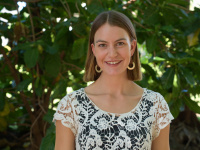

Stella Fulton
stella.fulton@my.jcu.edu.au
Masters by Research
College of Science and Engineering

Stella Fulton
stella.fulton@my.jcu.edu.au
Masters by Research
College of Science and Engineering
Ecological implications of macroalgal removal for localised inshore reef restoration
Stella is from Ballarat, Victoria, and completed a Bachelor of Science in Marine Biology and Applied Mathematics at The University of Melbourne in 2017. After graduating she spent some time travelling, volunteering and working in marine science before moving to north Queensland and starting her postgraduate research degree at JCU in January 2020. Stella has had experience in a variety of marine science areas including habitat restoration, aquaculture (coral, algae), and environmental consulting. Other than marine science, she has a keen interest in education with many years of tutoring experience. In her spare time she enjoys SCUBA diving, rowing, hiking, playing the piano, and baking!
Ecological implications of macroalgal removal for localised inshore reef restoration
2020 to 2022
Project Description
This project will centre around macroalgal removal as a coral reef restoration technique, based on Magnetic Island reefs. The growing dominance of fleshy macroalgae on many coral reefs is recognised as a threat to coral health and the people who depend on coral reefs for their livelihoods. Physically removing macroalgae has been proposed as a method to improve coral dominance on algal-dominated coral reefs. The current state of knowledge surrounding macroalgal removal was reviewed in 2018. This review highlighted important knowledge gaps related to the physical and ecological consequences of macroalgal removal. The primary aim of this project is to further understand the ecosystem-wide impacts of macroalgal removal and to determine its potential as a localised recovery strategy for inshore reefs. Specifically, the sedimentation dynamics and coral reef community composition associated with macroalgal removal will be explored using a variety of techniques. A key focus of the project will be the development of mathematical models to predict long-term effects and define thresholds for macroalgal removal as an active intervention strategy for coral recovery.
Project Importance
Rigorous science outlining the ecological impact and efficacy of macroalgal removal as an active restoration strategy is urgently needed. There exists a considerable knowledge gap in terms of understanding the ecological dynamics associated with coral-algal interactions and macroalgal removal on inshore reefs, as well the socioeconomic factors involved. Information regarding macroalgal cover and biomass, and benthic community composition have yet to be combined in such a way to assess the impact of macroalgal removal on inshore reefs. Additionally, the impact of macroalgal removal on abiotic processes such as sediment deposition has been relatively unexplored due to the infancy of its application as an active intervention method. Obtaining such data will provide insight into the physical dynamics associated with macroalgal removal and the implications for coral recruitment and recovery. This project will provide important quantitative information regarding the ecosystem-wide impact of macroalgal removal, allowing a critical assessment, incorporating mathematical models, of its potential as a restoration technique to aid coral recovery. The potential to validate and advance existing models using data obtained from this project for localised application presents a powerful research opportunity. This is a novel approach, since model validation on inshore reefs of the Great Barrier Reef has not been investigated to date and could therefore have widespread potential in a management context.
Project Methods
The approach used to investigate the impact of macroalgal removal on Magnetic Island reefs will involve experimental site set-up, pre-removal assessments, macroalgae removal events, post-removal monitoring, and data collation and analysis. The site set-up for this project will involve establishing six 25m2 experimental plots each in two bays around Magnetic Island. At each site, there will be three control plots and three treatment (macroalgae removed) plots. The corners of each plot will be marked out using capped star pickets. Baseline assessments prior to macroalgae removal will be conducted in the middle of the year. To assess the effect of macroalgal removal on microenvironmental conditions; sedimentation dynamics, turbidity, and temperature will be measured using a variety of instruments. The ecological changes associated with macroalgal removal will be explored using underwater surveys and photo-quadrat analysis. Settlement tiles will also be set up to measure coral recruitment. Fleshy macroalgae will be removed from the treatment plots by hand every two months, timed prior to spawning (approx. Aug-Sep), after which monthly monitoring will occur to pick up temporal variation in the measured parameters. Monitoring will involve the same metrics as the baseline assessments and will continue for the duration of study period. Once a substantial amount of data has been collected, existing mathematical models (e.g. ordinary differential equations) will be built upon and further developed to explore the ecosystem dynamics associated with macroalgal removal. This will allow the prediction of macroalgal impact under varying conditions and the potential to identify thresholds for conservation and management applications.
Project Results
It is hypothesised that there will be considerable impact on benthic community composition as a result of removing macroalgae from inshore reefs around Magnetic Island. The potential changes in the ecological communities on these reefs may be conducive to increased coral recruitment and therefore assist coral recovery and re-establishment. Similarly, it is expected that there will be a noticeable difference in sediment deposition following macroalgal removal which may lead to a better reef environment in terms of coral health and growth. The models developed using the data obtained from the field-based experiments and monitoring efforts are expected to provide information on the stability of the reef ecosystem in its current state and the potential for macroalgal removal to induce a shift towards coral-dominance.
Keywords
Algae,
Benthic,
Climate change,
Coastal development,
Communication / Education,
Coral reefs,
Corals,
Ecology,
Field based,
Fish,
Management tools,
Manipulative experiments,
Modelling,
Monitoring,
Natural disturbance,
Pollution,
Porifera (sponges),
Quantitative marine science